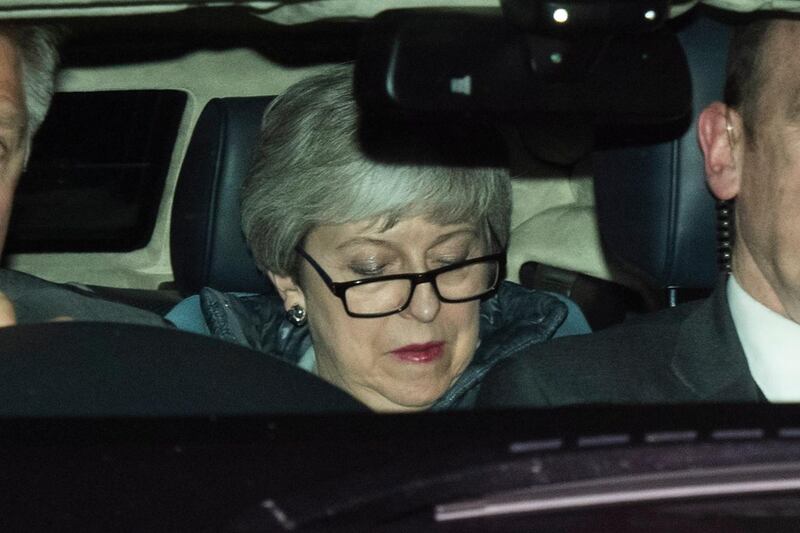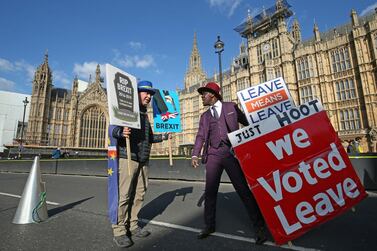Britain's Parliament has voted to take control of the Brexit process from embattled Prime Minister Theresa May.
In an unprecedented move, MPs gave themselves the power to express their own preferences for a range of alternatives to the prime minister's twice-rejected Brexit divorce deal.
Those options are likely to include a softer Brexit and a second referendum.
The ability to revoke Article 50, the mechanism for the formal exit from the EU, could also be an option voted for by MPs in a series of indicative votes, which will take place on Wednesday.
The government was defeated by 329 to 302, in a larger margin than many expected.
Mrs May said the House of Commons taking control set an "unwelcome precedent".
Alistair Burt, the Middle East minister, was one of three ministers to resign from his role in order to vote against the government.
In a statement released on Tuesday, Mr Burt said Britain was "running out of time for an alternative" and warned that the threat of leaving without a deal was harming the country.
He added: "Parliament should seek urgently to resolve the situation by considering alternatives freely, without the instruction of party whips, and Government should adopt any feasible outcome as its own in order to progress matters. I did not believe the Government was prepared to do that, so had to vote to ensure this happens."
Government has lost its best minister in @AlistairBurtUK to a totally unnecessary defeat. Good on him.
— Wes Streeting MP 🏴 (@wesstreeting) March 25, 2019
MPs from across the political divide tweeted their support for Mr Burt's decision, including fellow Conservative Tom Tugendhat, Labour Party MP Wes Streeting and Sarah Wollaston, from the Independent Group.
Widely respected across the House of Commons & an avoidable, serious loss to Govt @AlistairBurtUK Thank you for voting with your conscience Alistair to make sure the Commons can ‘take back control’ & stop the disaster of No Deal
— Sarah Wollaston (@sarahwollaston) March 25, 2019
The loss of @AlistairBurtUK will be a major loss for @foreignoffice. His experience and friendships across the Middle East and calm command of the detail is unparalleled. His integrity is second to none. I’m sorry to see him go.
— Tom Tugendhat (@TomTugendhat) March 26, 2019
Business minister Richard Harrington and health minister Steve Brine also resigned.
In his resignation letter, the Mr Harrington said he feared that a no-deal Brexit would be an “economic experiment” that a small minority of the Conservative party and UK would champion.
Overall 30 members of Mrs May's ruling Conservative Party defied the whip by voting against her instructions.
The Leader of the Opposition, Jeremy Corbyn, commended Parliament for passing the amendment, which had been tabled by Conservative backbench MP Oliver Letwin.
"I would like to congratulate the House for taking control," Mr Corbyn said. "The government's approach has been an abject failure and this house must work together to find a solution."
Labour MP Hilary Benn said the indicative votes would allow parliament to take responsibility for Brexit because the government "isn't doing its job".
There have been a string of resignations since Mrs May took over as prime minister after the 2016 EU referendum.
Earlier on Monday, Mrs May accepted that her Brexit deal did not have enough support to allow a vote in Parliament that would set Britain on course to leave the EU at the end of May.
She said she would continue to try and win support from MPs to push through her plan for leaving the EU, only days after Britain was granted an extension to the departure date.
Meanwhile, one pollster said that evidence showed that Britons had become "deeply critical" of the way Brexit had been handled by the government.
Writing for the BBC on Tuesday, Sir John Curtice, who famously predicted the surprise result of the UK's 2017 general election, said more people than ever would choose Remain over Leave if asked to vote again in another referendum.






